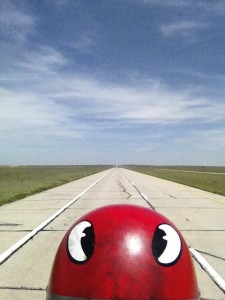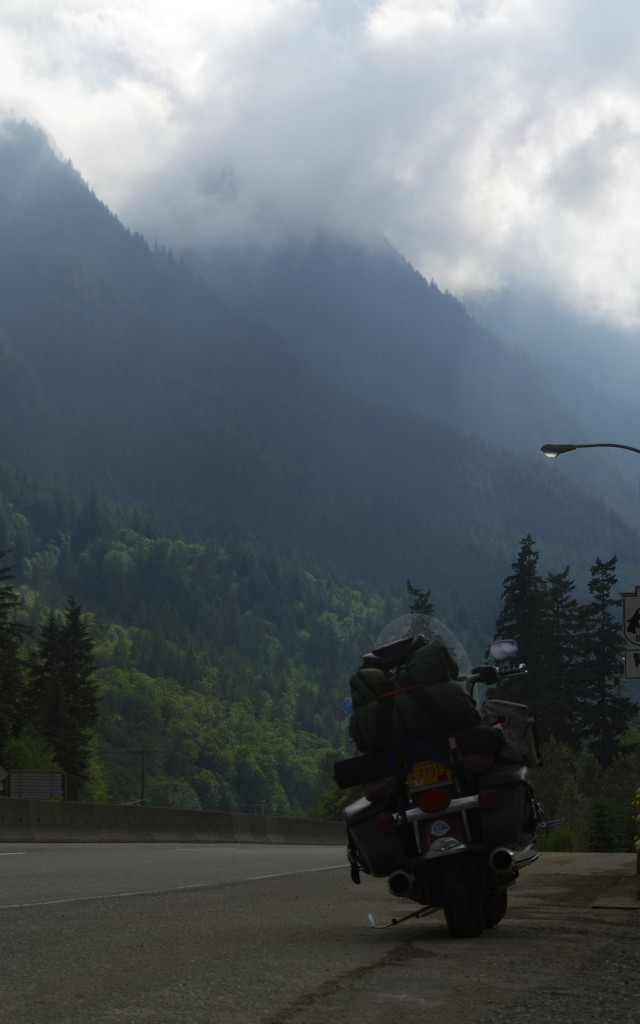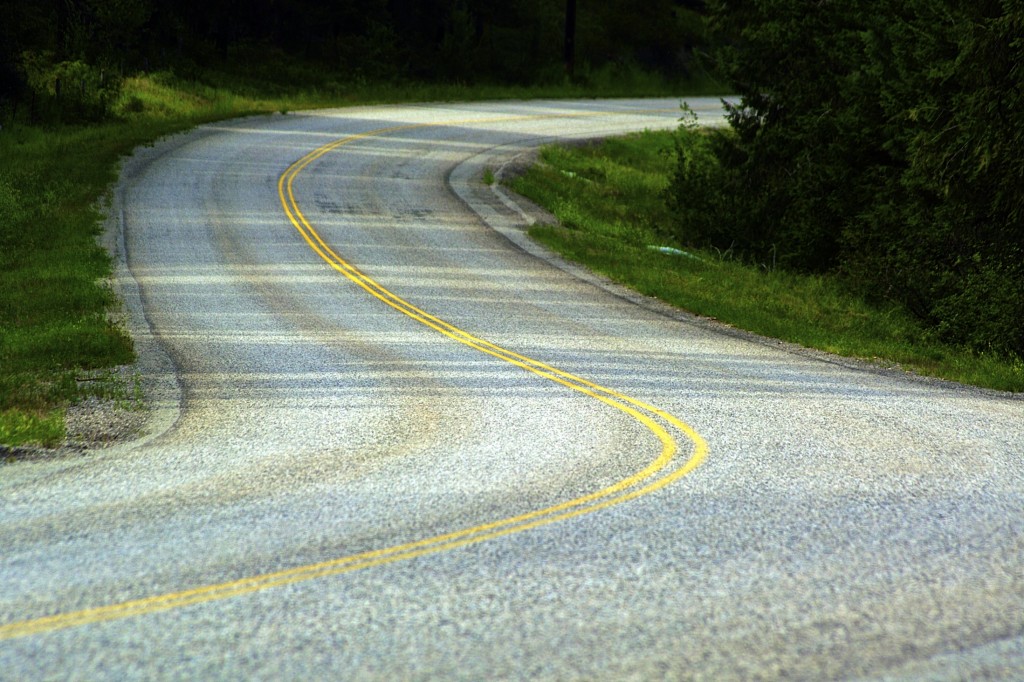Archive for June, 2013
The early summer breeze blew crisp across my face this morning as I stood at the bow of a ferry. Two days had passed camping on the island, and now, with the landing at Horseshoe Bay wheeling into sight, I anticipated a day of riding across the southern-most highway of British Columbia. But to get to that highway, I had to cross through Vancouver, and the wide Frazier valley. The ferry landing at Horseshoe Bay, on the west side of Vancouver, was my starting point.
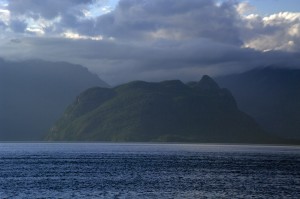
The deep fjord in which this small harbor hides pushes the earth out from its depths into spectacular mountains. Â Snow caps could be seen in the background. The languid leisure of the ferry crossing shook itself into the excitement of navigating the offloading ramps, which swept
neatly onto the highway that hugs the edge of the fjord, curving around the mountain’s foot, and bringing the city into view. There is a sense of being welcomed to the city, and indeed, that is another ride, down from Lillooet, and Pemberton, and Whistler. Â I join the parade as it enters the city, blending with the late commuters, and soon a bridge carries me over from the forested hillsides into the vast expanse of industry and humanity.
I immediately want out.
It’s not that Vancouver is a bad city, but it is – well – a city, and a big one. A constant whirl of lights and sounds, people, and things constantly in motion, threatening to sweep you away if you don’t keep moving. By prior planning, I chose to take the less traveled highway 7, but it requires a few miles of city street driving. The road where it leaves the city is well-worth it. I take the plunge, and begin working on survival.
There begins, after quite some time, to be a sense of change in the pace, and the density if traffic and industry. A short break, another town, a few technical curves, and suddenly, I realized I’d drifted out into a wide flat valley, with no city in sight. It didn’t fade, didn’t stretch and thin and gradually disappear. There was just Town, Curves to distract me, and poof! it was gone. And in the sudden drifting spin of my head freshly ejected at the bottom of a rapids, I hear myself saying, “yeah, and a good riddance too!”.
The Frazier valley is as much a fjord as the ferry landing at Horseshoe Bay, but without any of the deep water. Â The bottom of it is wide and flat, the hills jutting up suddenly, sharply, and majestically into tall mountains that line its edges. Â The road swoops and swings along the northern bank of the Frazier River. Â As soon as the city is left behind, the dairy farms start, then the sawmills show up, and then, finally, the breeze that had blown crisply at my back on the ferry drifted into an afternoon languor. I settled into a relaxed pace, and picked my way through a half dozen small communities that embraced the spirit of this lazy summer afternoon. Nothing ahead seems important enough to rush to. Not even farm tractors turning onto the road with their loads of manure could disturb my peace.
And so it is with a good long ride, if one thing can’t tempt you out if your comfort zone, something else will. As I eased up this wide valley, skirting along its edge, I become aware of the southern edge of the valley, closing northward. Rounding a corner, I saw directly in my path, still miles away, a peak jutting up from the valley floor from the other edge. It stood up in one continuous, straight slope from the valley floor, covered in evergreens, until its altitude and slope could no longer hold sufficient air and soil, and it left living trees behind. Even further up, the rocky slag was covered with snow, and finally, that snow disappeared into a soft cap of clouds. Â This whole scene was still far off, but even with the scale of distance, it commanded my attention, and I had to fight to remain aware of the road.
The road wound and twisted, but gradually its intent emerged. This peak constantly crossed my bow, and grew both in size, and my mind’s awareness. In twenty miles it transformed from a distant warning to an impenetrable wall. I could think of nothing else but enormity. But then, abruptly and at the last minute, the road turned north, and the valley’s northward rise shows itself. Â This mountain instantly transformed from barrier to gatepost, behind which the other peaks began to impose their presence on either side. Instead of one single iconic peak, I was suddenly in the midst of a herd of mountains, and the movement up the valley began to seem as if they ran with me up this narrowing valley like wild horses. I felt their energy, the thirst to remain wild, and separate from the world of humanity below. I subconsciously rode a little faster, pulled up the subtle grade of the narrowing valley by the instinct to race, for the pure joy of the wind pushed across my face.
Narrow inlets appeared between peaks, gateways to secret spots tucked into the wilderness above. It was always “above”. I hear a phrase from my childhood, man is born to trouble as the sparks fly upward”. Â I smiled at the irony of my instinct to rush faster tow
ards it. I gripped the throttle tighter, focused for a moment listening to the angry roar of the machine beneath me.
For a short space the highway flattened out, the road gathering itself for its impending leap upward. The hills to my north fell back, and I raced headlong across an expanse of the open land. A bulge of a hill lies alone in the middle of this flat section of valley, and the road was pushed up against this hill where the river’s tail snakes across the valley floor. I crossed the expanse to the hill, feeling the thundering hooves vibrating the earth. At the bottom of the small hill, I felt myself lifted, and my ride transformed from a wild horse to a Pegasus, freed from the earth, hooves weightlessly pawing the air. Â For the space of a few hundred yards this sense of lifting off continued, until the hill’s far side let me back down to the earth. Like a yearling mythical colt who has just experimented with its first flight, the thunderous clamour of the horse’s gallop returned. I felt the weight return to my feet, to my saddle, my body settling back to its familiar position. Â I ran earthbound once again with the wild mountains, horses in their own way. But that brief moment forever changed me. This moment is the one that I cling to, the memory that there is something more than mindless racing across the land. There will be a time, and a place, where I will soar again. When you learn to crawl, you move to walking. When you learn to walk, you reach forward to running. When you’ve learned to walk, running is the next step. And now, when I perfect running, I will soar. I can only imagine what comes next, but I can hardly wait to find out.
Â
For the moment, though, I raced onward. The canyon narrowed yet further, and the sides of this valley felt like sweaty equine bodies stampeding forward, urging me to abandon my purposes, to let go and just run. We galloped together, but begin to watch for an escape, a way out of this dead-end run. We jostled, these mountain peaks and I, fighting instinctively for position, but the drive to run still first in our mind. Looking left, looking right, the river flooded out broadly across nearly the whole breadth of the valley. This stampede is all but over, and for the moment, no outlet yet appeared. Â Mountains of a different sort appeared. As tall as these other mountains have been, the ones coming into view are taller, towering over everything – everything. These are the Lords of this place, the keepers of the secrets of the wilderness. They are steeper yet than those that I suddenly realize now lie behind me, stubbornly pawing the air but stopped in reverence to this new landscape. T
hese are steeper. Â And wilder. And eagles fly in their midst.
I crossed over the bridge into Hope, my heart still pumping the excitement of the run through my being. I breathed the excitement down, slowly, as I eased reverently up the main street, and into the presence of these giants looming over me, nodding their solemn welcome.
I stop for a rest, and to collect my thoughts from this past couple hours, and feel a familiar nudge behind me. Turning back to look down at the valley, the languorous wind nuzzles me like a young colt, freshened and ready for the evening. While I was distracted by the peaks before me, it too joined in the race, kicking up its own heels, running up these slopes with the abandon of wild things. I smiled a sense of kinship, and rested. In a short time I will enter the temple of the Wilderness, and I should be at my best.
I don’t always get to ride just to ride, without some end destination in mind. Today’s ride was about riding until I decided to turn around. I didn’t find that destination for about 30 miles. Along the way, I lost a lot. First I lost speed, because of the 25mph corners. Then I lost my knowledge of where the road I was on was going, when I turned onto a road I’d never been on, and didn’t really know where it went. Then I lost the oncoming lane – the road turned into one of those one-lane roads where people just figure out how to get past each other in the unlikely event that they meet someone. finally, the paint on the roads disappeared – just a flat piece of asphalt, no markings, no signs, nothing. And right about then I began to realize that losing stuff can be the greatest feeling in the world. And I began to give up things voluntarily. The sound of my exhaust is a low, loud rumble that is somewhat unique – a little different than the usual Harley sound. It’s tempting to hold back a little bit, but when you let go of that internal resistance to the sound, it fills you up, holds you up, and your whole being is powered by that vibration. I gave up my interest in going fast, 40mph was as fast as I felt like I needed to go. Last, but not least, I gave up my expectation of getting somewhere. each moment, each corner, every straight stretch, tree, river, hill – each one became just a moment unto itself. Its funny how when you get to where you need to be, you realize you didn’t need to go anywhere particular to get there.
Ride Report: Coquille, OR to Sunnyside, WA
 Jun.6,2013
Jun.6,2013I decided yesterday early on that a beaten path is an abused path, and that I wanted no part of such violence. So I set out to stay off the interstates as much as possible.
I left Coquille, Oregon heading north, swinging through Coos Bay and on from there, through towns familiar to me from years of traveling this coastline. The town signs are old friends of mine, and I greeted each one: Reedsport, Florence, Yachats, Waldport. Depoe Bay. Newport, Lincoln City – and the half-dozen or so small villages in-between them. The route is among the best scenic drives in the country, passing the dunes of Florence, the rocky cliffs of Cape Perpetua, sand bluffs dotted with cottages, the fishing harbors of Depoe Bay and Newport, and the wide beaches where vacationers fly their kites in Lincoln City. I rode through 200 miles of coastline, these communities each serving travelers from all over the world. I know of nowhere else where so much can be experienced in so short a space, and yet be held together with one common theme.
When Lewis & Clark drew near to the end of their westbound quest, the smell of salt air was a portent that lifted their spirits, and pushed them through the final leg of their journey. At the mouth of the Columbia, they saw nothing but mist, sitting in their boats in the midst of this brew of seaweed, salt, fish, and the vibrant life brought together by this confluence of the collective worlds by the river, held by land, and accepted by the sea. They saw nothing, but they could smell what they had been searching for for a year and a half.
Salt Air.
Once you’ve been to Sea, its smell becomes the badge by which you recognize your home, the connective tissue that binds you to those who served with you, before you, and around you. No man survives the sea alone. No man, once baptized in its brine, ever entirely leaves the sea behind.
It was through this place that I rode through the morning, my senses drinking in the sun, the ocean spray, the cool salty breeze, and the rush of wind through my helmet. Â I soaked in these senses until I reached the marker that pointed me inland. There, by arrangement, I met my dad on his bike, and we traveled through the low-lying coastal range from Lincoln City, through the rain forest with its rich undergrowth, giant trees, and the smell of ancient presence, growing in deep silence. Each tree is home to dozens of species of plants and animals. Even the wide branches have soil on them, formed by the one driving force beneath everything that happens here – constant, steadfast growing and dying, over and over. Everything is connected by life and death.
My brother and I, once when we were young, cleared a patch of underbrush in the forest behind our house. By the next year, it was completely overgrown again, you couldn’t tell that two kids with machetes had ever been there. It is through forest like this that my dad and I rode today, over the hills, and starting on their eastern flanks began one of the country’s most fertile valleys.
The Willamette Valley not only is home to Oregon’s largest and most productive agriculture, but is also the center of its densest population. After miles of riding through farmland, the towns began to run together, and all too soon completely merged to form the Portland metropolis. The tone of the ride changed from curving, wandering roads with light traffic to city driving – stop and go, constant attention to the developments ahead, people shifting lanes – it becomes little more than survival. But…this is how I get to Busters Barbeque. The trip through the city is worth it when it involves a stop at Busters. Â Happily, I had business to conduct on the far side of town, so through the metropolis I went. Â My dad and I had our usual, and then parted ways, he returning home, and I carrying on eastward.
Leaving the city to the east, as the buildings are replaced with fields, and the traffic thins, there’s a game I play – guessing which of the immediate traffic is commuting, and which traffic will continue on into the Cascades with me. I seldom guess wrong, though I can’t tell you how I do it. There is, I suppose, a certain vibrancy in the attitude of the long-distance traveler, the anticipation of liberating oneself from the city life. How that vibrancy is communicated to me, I don’t know. Maybe it’s an empathy for freedom. One by one the commuters turned off, the sidewalks disappeared, and the buildings were replaced by trees. The road began to climb, and a sense of adventure settled in over me. In the distance the dormant volcano loomed above the tree line, its peak covered in snow. The city could be seen behind me in the mirror, framed by the gap in the road between the encroaching trees. Â Late afternoon shadows cooled the air, and sometime shortly after the 2000 foot altitude sign the city smoke and dust was replaced by a crisp alpine scent. At a highway junction , the last of my fellow travelers turned to other destinations, and I was left alone with my machine, the road, and the mountain.
This particular road loops around Mt Hood, slipping over a gap between it and the next southern peak, and then dropping down an old Indian trail. Â Before it was a road, it was a trail was used by pioneers to get to the Willamette valley as an alternative to rafting down the treacherous rapids that would, generations later, be converted to a dammed lake. The Barlow Trail, as it was called, was crossed by use of chains, snubs, teamed oxen and the blood, sweat, and sometimes tears of the men who dragged them over this pass. I pulled to the side of the road, and listened to the sounds of the birds, the stream in the canyon below, and the gentle whisper of the wind through the trees. In my mind, I added the clank of chains, the shouts and grunts of men laboring with their equipment and teams of oxen, the snort and puffing of struggling animals, and the disjointed creaks and groans of heavy-laden wagons being dragged unwilling through this alpine wilderness. The thought always leaves me amazed at the determination of those pioneers.
I mounted my bike, pressed the button, and with a twist of my wrist sped off down the winding, paved descent.
Returning again to civilization in Hood River is, from the mountain, another kind of awakening. From the wild backlands to orchards perched on plateaus overlooking the Columbia, working life was settling in against the long shadows of evening. The aquatic smells of fish, algae, and fresh water hung heavy in the air over the last plateau. At the bottom lay the river, not just a river of water, but of life – goods and people flowing back and forth, connecting different cultures together – the farm and range land of the east, and the city to the west. I turned eastward again, and chased my shadow upstream, up the interstate for a short stretch to The Dalles, with the sun sliding into the horizon behind me.
All too soon I had to leave the river again, crossing a steel bridge over the tumbling water freshly spilled through the gates of the dam, climbing the steep river gorge walls to the north. Â As I climbed, night fell, and within 20 miles of the river, night had emerged. I stopped, put my heavy jacket back on, masked my face against the evening cold and bugs, and slipped warmer gloves onto my hands.
The road continued to climb, even after reaching the top of the canyon walls that frame the Columbia. The air, already much-cooled from the midday heat, developed cold pockets which I burst through like spill water. At the pass’s peak, I paused for a few minutes to take in the descending gloom. The forest had thinned, and before me on the eastern slopes it disappeared completely, leaving an arid landscape. The twilight, spilling over the western horizon, was still fading, only the first stars had emerged as I mounted up again. I rode northward, with the rose- and orange-hued embers of sunset still simmering on the horizon. Before me lay another descent through a wide valley. Below and across the valley, silhouetted against the gathering night, was the razor edge of the naked, far rim of the plateau, over which one more descent dropped into the town that was my destination tonight. I twisted the lever for a little more speed, and my headlamp bulldozed a small wake of light across this vast expanse. To my left, above the simmering cauldron of the unseen Sea, the sky glowed turquoise, dotted with the brightest stars, and faded to a vibrant black above. To the east, the newborn midnight sky still lay in its cradle of evening eastern gloom, slowly shedding its swaddling of the day’s dust, and evening mists. But above me, glowing like a righteous prophet, was a band of clear, bright sky, ablaze with its stars, still vibrant after shedding its old skin. I felt so separated from the rest of my race, standing alone on a stage meant for a production of much, much larger scale, but relieved to be free of the intrigue and deceit we humans invent.
My bike and I dropped into the valley through a wending path that shadowed the caroming mountain river for a time, and then spread free across the widening expansive bowl that formed this wide basin, our small presence feeling lost in the palm of the earth, and I wondered to myself, with the stars above me, if anyone, anywhere up there could see my passing. I gazed upward, engine droning its persistent rumble and wind swirling past me, overwhelmed by the comparison of the universe. And out of that infinite blackness came a soft chuckle, a smile of good-hearted condescension, whispering in a tone that was deafening to the frailty of my own ability to translate the scale of its spectrum,
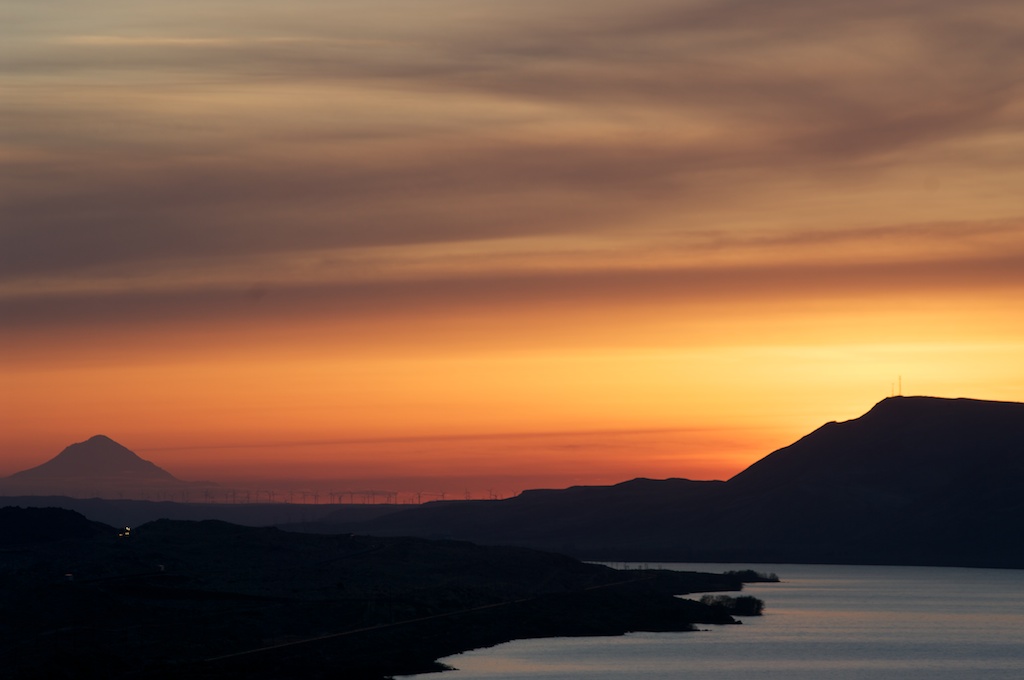
” You are noticed, little brother”, it said, and smiled a smile that could only be heard.
And I smiled back, despite the condescension, despite the patronizing pat in the head. Like any child, I clung to the important part of the conversation. The universe had noticed me, and had called me brother.
And then, lifted over one last rise, as the city lights below came into view and I was drawn back to the world of reality, I took a deep breath, and plunged back into the turmoil of human life, thinking to myself,
“Maybe I stay up too late riding sometimes…”

 Filed Under :
Filed Under : 
 Tags :
Tags : 
